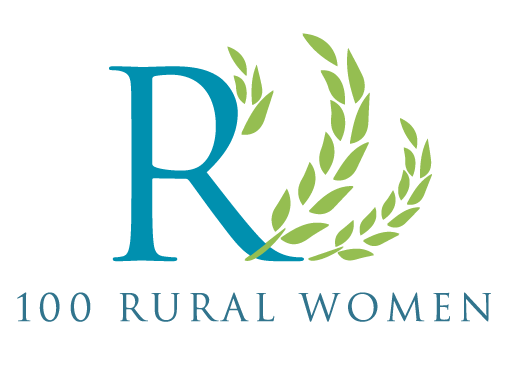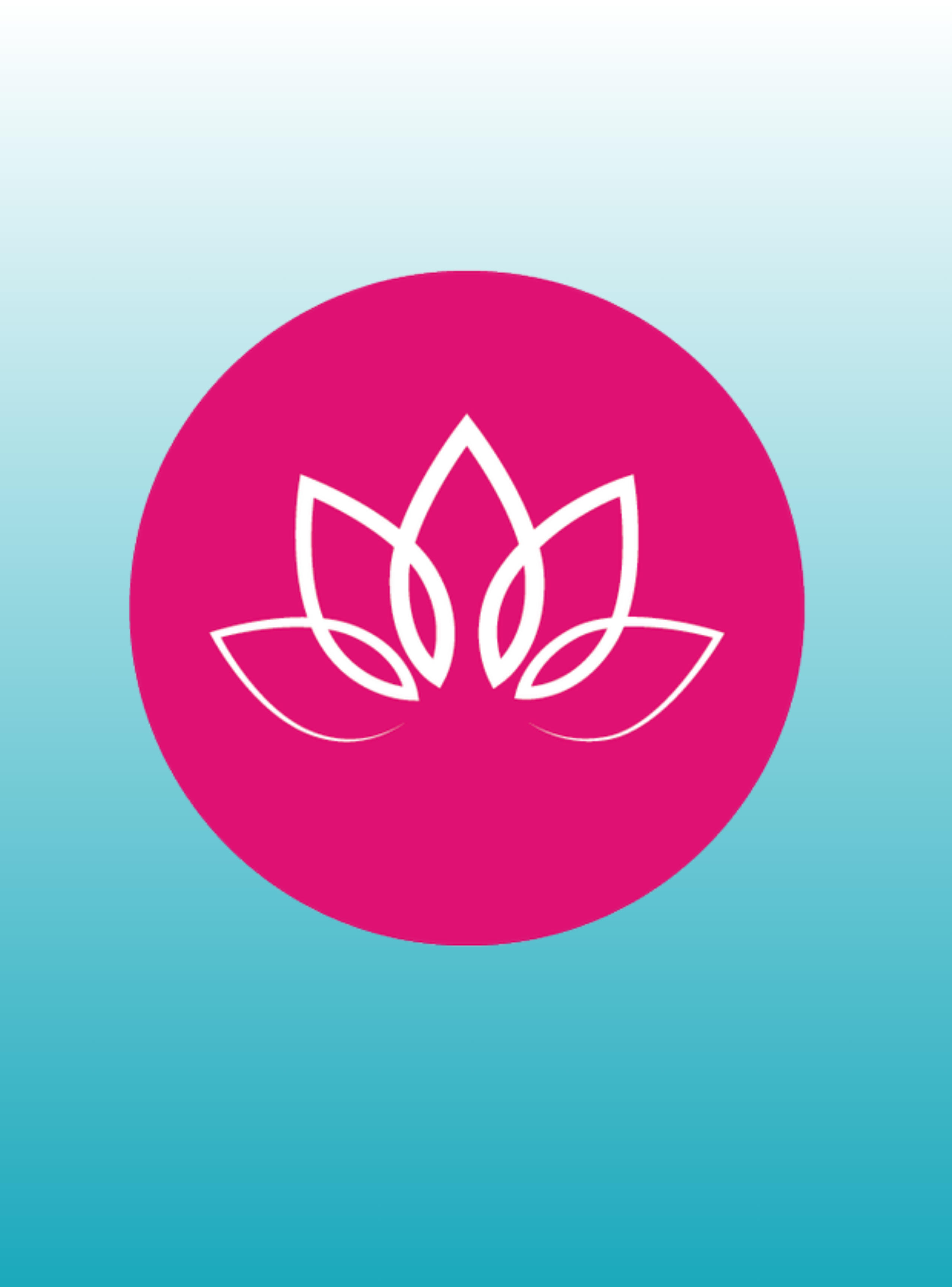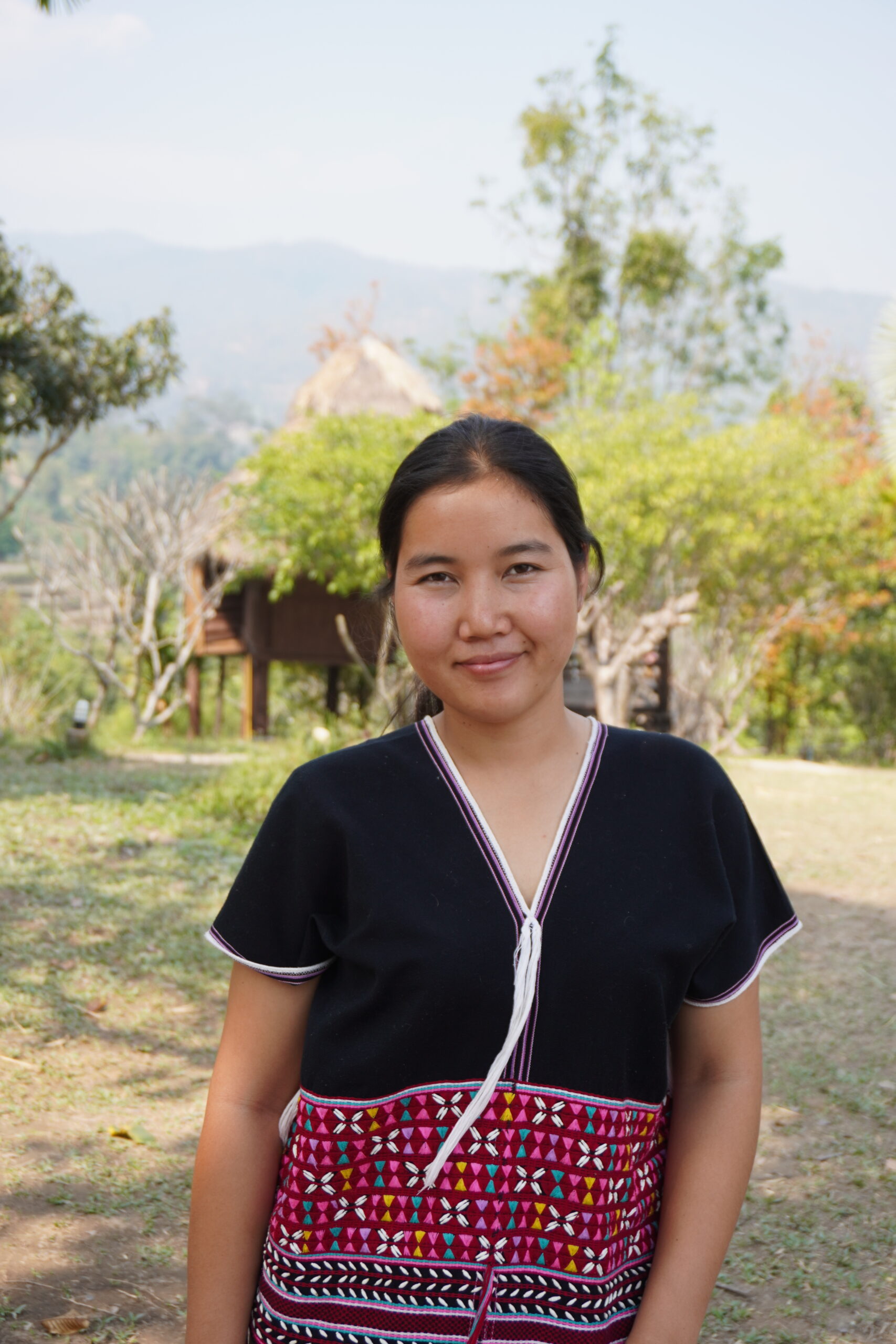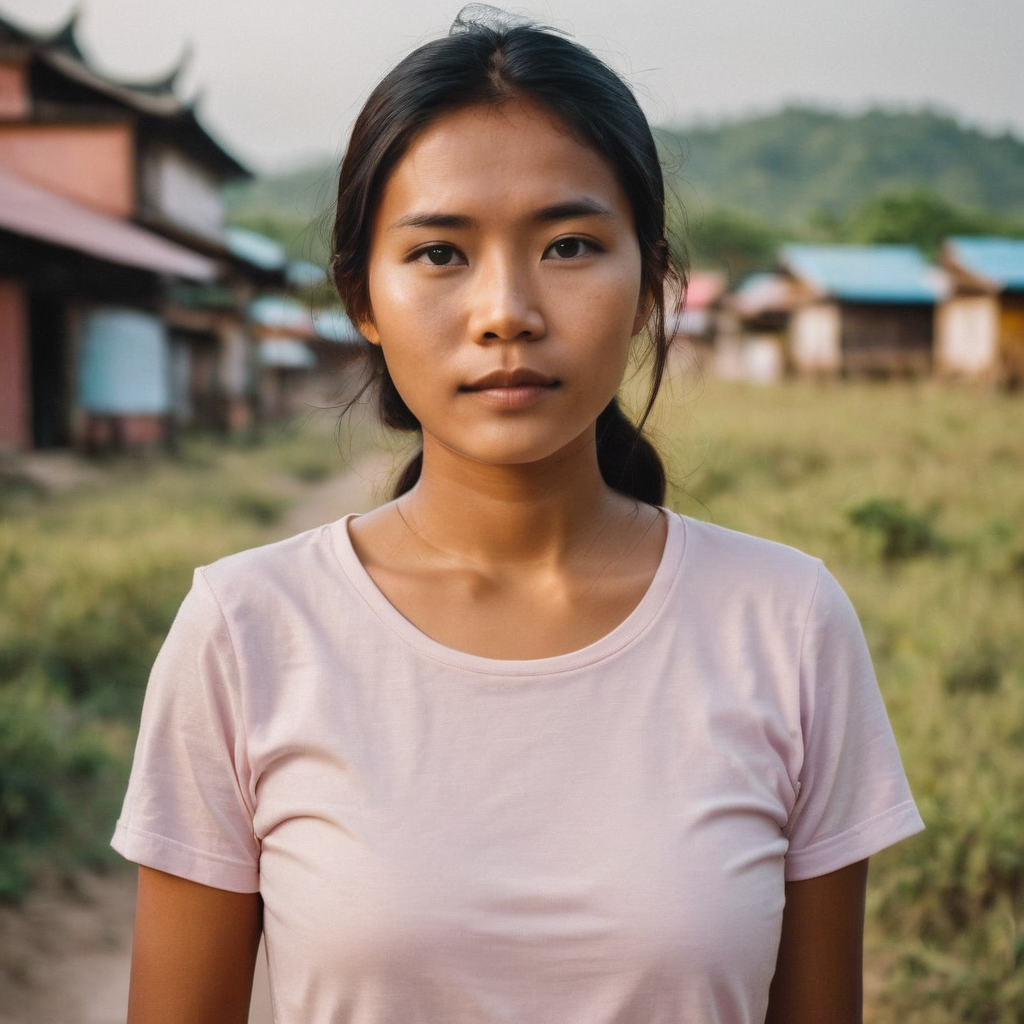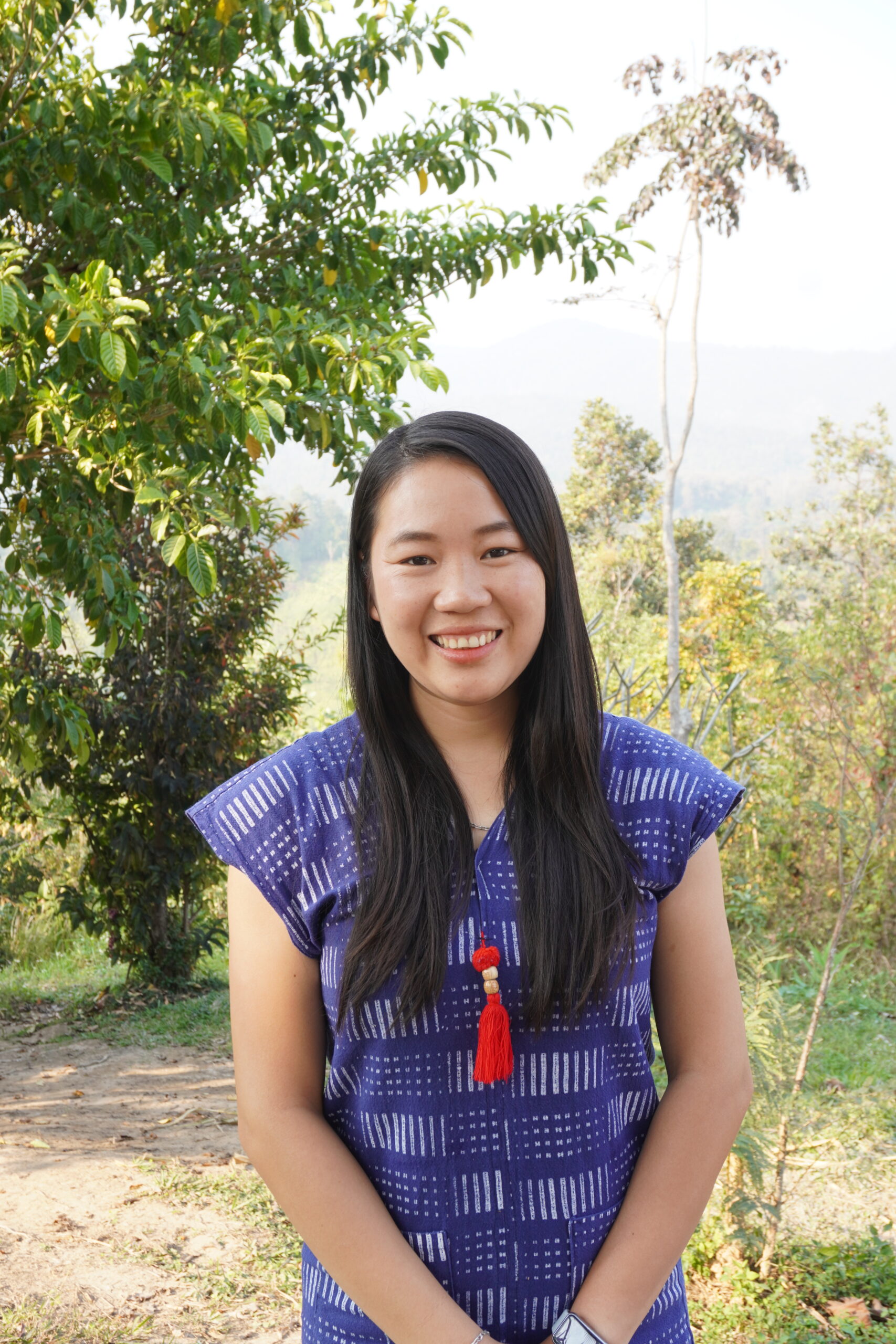“If you wear a Karen shirt, it means you are wearing a blessing from the people who made it too.”
In January of 2023, our staff member Alexa had the privilege to sit down with two Karen women at their village home in rural Chiang Mai. They shared their lives, hopes, and experiences as women. We feel honored as an organization to give them a spotlight and be the platform to share their stories.
**DISCLAIMER: this interview has been translated, transcribed, and condensed for clarity purposes. The final article was reviewed by the Daughter Rising team to ensure accuracy and integrity of the original interview was kept.
From Alexa(100 Rural Women Staff)
“I feel honored, really. They trusted me with their hearts, their stories. They gave me fruit and welcomed me into their home. I recognize they don’t owe me this and I feel incredibly grateful to learn from women like them. I’m inspired by their grit and perspective. I never thought I’d have an opportunity like this and hope one day I can see them again.”
A special thanks to Malida with Daughters Rising who translated for both parties during the interview and connected us with P Doh and P Por This would not have been possible without your help.
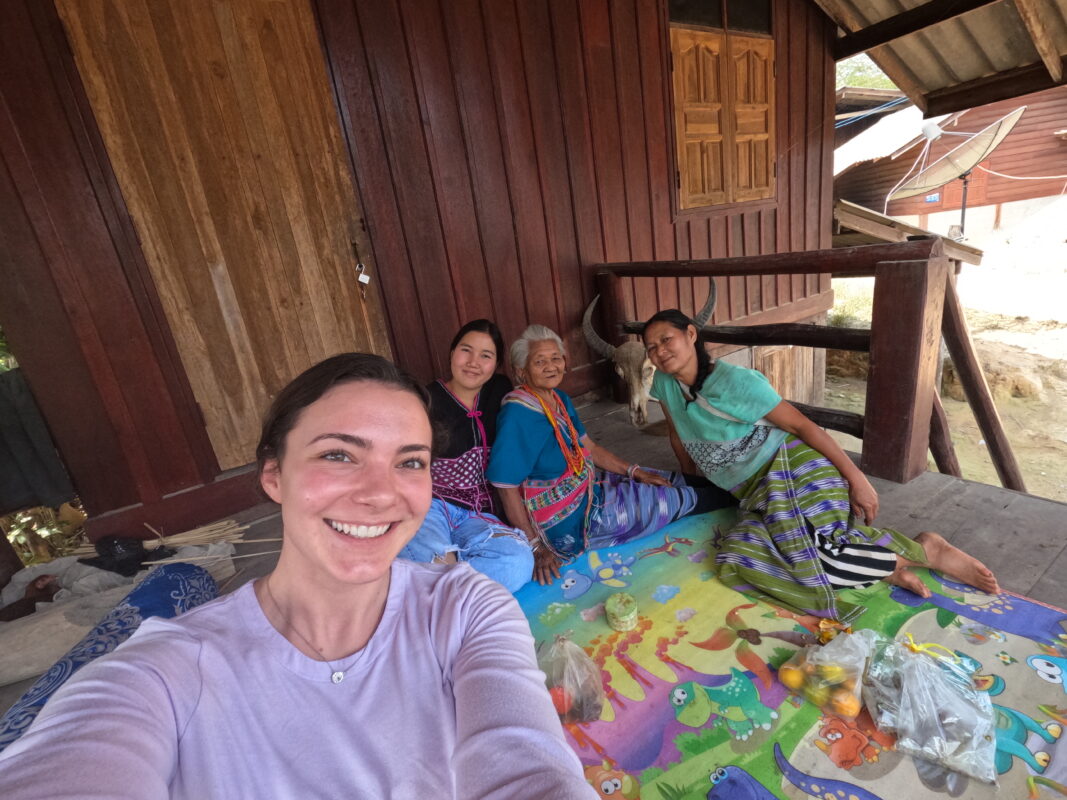
Left to right: Alexa, Malida, P Doh, P Por
P doh
P Doh is an 85 year old Karen woman in the village of Mae Sapok. She has been married to her husband with whom she shares six children, four daughters and two sons. She is also a grandmother. She grew up with her mother, father, older brother, and older sister, all who have passed in adulthood.
What was it like to grow up in the village here?
Born in the village of Mae Sapok when it was merely a jungle with only three houses. As she grew up, more people came to village and built homes and she has watched it grow from there. She never went to school. She recalls a memory from her childhood, when she was about 8 years old. During the Japanese war, soldiers had come in and ravaged the village. They stole their chickens, pigs, and food. She remembers fleeing the village for three days, her mother carrying her. After three days, they returned to the village but she remembers they had to stay quiet. They could not make any noise, they could not light any fires.
What’s it like to be a mother in the village? Do you work together to raise your families?
It was difficult. Mostly, the roles were that the father go and work outside the home and the mother take care of the kids while also working. She remembers carrying her youngest on her back and another child on the front while she worked. At the time, there weren’t motorbikes or trucks in the area, she walked everywhere. In the cold season she didn’t have a jacket or blanket for the children. Sometimes the neighbors help you take care of your kids, but hey also needed to go out for work so she mostly had to take care of the kids by herself. It is different now. Now, both men and women may go outside the home to work.
[row_inner_3 v_align=”middle”] [col_inner_3 span=”6″ span__sm=”12″]
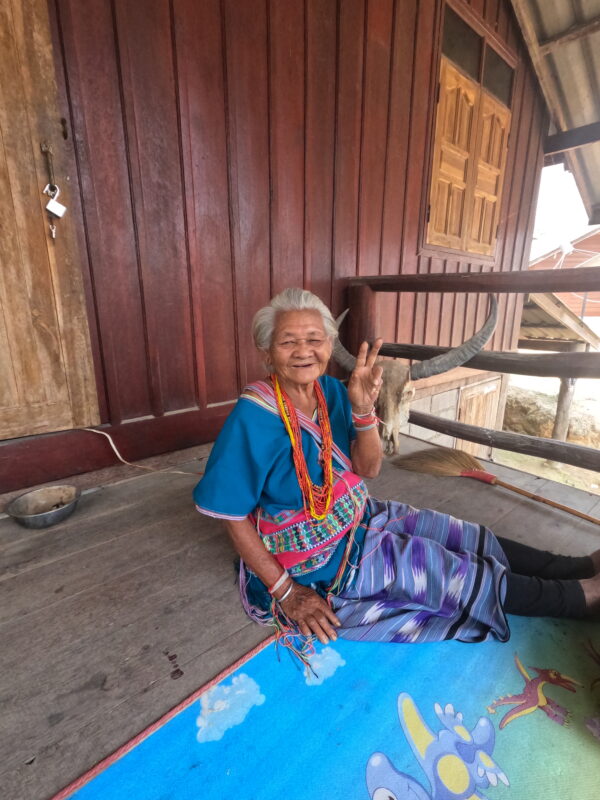
How do you approach pregnancy and childbirth?
I didn’t not take any medicine and I never went to a hospital when I was pregnant. I only used herbs in the jungle. One other woman helped me to give birth. When we are menstruating, we don’t use products, we just would wear the long dress for a few days.
Do you find that people will grow up and stay here or do the kids often move away or do they go to school and come back?
I did not go to school. But for most people, they will leave the village to go to university and come back to work when they are done.
What are common jobs here in the village?
Mostly tour guides because of the elephant sanctuary here.
[/col_inner_3] [/row_inner_3] [row_inner_3] [col_inner_3 span__sm=”12″]Do you like when people come to visit the area or prefer they don’t?
I really like it! It helps to bring income and gives me a chance to practice my English since I didn’t have the chance to go to school. Before COVID-19, I had a homestay. Tourist would come and stay for 20 baht per night. I was sad when they could not come anymore, I was really happy to see people visit and would want to do a homestay again. If someone comes to stay, the Karen people will welcome you in and make you feel like family.
What are some things about the Karen culture you’d like to share?
Growing up, we believed in the spirit of the jungle. We asked the spirit for healing and protection. When someone on the house was sick, we would go to the forest to perform a ceremony of killing a chicken or pig under a tree and ask the spirit for healing. Then we return home to see if it worked. If the person still did not feel better, then we would have to do the ceremony again.
Did you use any medicines?
We used natural medicines from plants in the jungle. And I think the herbal medicines are a lot healthier than these chemicals and pharmaceutical things.
One tradition I’d like to share is the wrist tying ceremonies. We do this before we plant rice and again before we harvest the rice. The rice is a big part of our culture. Before we plant the rice, we ask the spirit from the Jungle to protect our rice, help it to grow well, as well as protect our people and keep them healthy to work on the rice. When it’s time for harvest, we thank the spirit from the jungle for providing us those things. During the harvest, we cannot say the word “elephant.” This is because elephants are big and may scare the small rice, causing the spirit to go away. If we do say the word “elephant” we would need to do the ceremony again to ask the spirit to come back. The wrist tying is a way of thanking them.
What happens at a wrist tying ceremony?
Every member of the family must be present for us to do the ceremony. You have to keep the wrist ties on for at least three days and nights. After that, you can take them off or just wait until they break off. After the ceremony we enjoy the first meal with the new rice as a family. The first step is to cook the rice. Then, we must kill the chickens or pigs. Each time we do the wrist tying, we must kill one male and one female of either chickens or pigs. We eat the entirety of the animal. The first to eat is the leader of the family. First my father, then mother, then oldest sibling, down until the last child. It was very difficult to do this because not every family member could always come home. But we have since switched from believing in the spirit of the jungle to practicing Buddhism. When we are Buddhist we can still do the ceremony, even if all the family members are not present.
What makes you happy?
To see my children and family happy.
What are you dreams?
I don’t want anything for the future anymore. Each day is good for me. I don’t have much money, but we are taken care of. I just want to be with my family here.
[/col_inner_3] [/row_inner_3] [row_inner_3] [col_inner_3 span__sm=”12″]p por
P Por is a 52-year-old Karen woman in the village of Mae Sapok, daughter of P Doh. She has been married for nearly 40 years to her husband with whom she shares two children. They all live in the village.
[row_inner_4 v_align=”middle”] [col_inner_4 span=”6″ span__sm=”12″]How did you and your husband meet?
We are from the same village and we fell in love.
Did you ever go to school?
I didn’t go to school as a child, but after I had my first baby there was a teacher from the city that would come to the village and teach us at night after the kids go to sleep.
I’d love to hear more about the shirts you’re wearing. They’re traditional to the Karen culture, could you share about their meaning?
Yes, weaving the shirts is something every woman must learn to do. It is all weaved by hand, which takes about one month. After that, you sew it together by hand as well. We use no machines, so it takes a long time. And if you want more color or decorations, it takes even more time. The mother will make a dress for the girls and a shirt for the boys. It represents the love of the mother for her children as it takes a lot of time to make it. While she is weaving, she is blessing it for that kid. Then, once the child will get married, she will make them a new one. After you are married, you cannot wear the white shirt anymore, especially if you’re the woman. So before each daughter gets married, the mother will make a new red shirt and skirt for them while blessing it for the daughter and her future family.
[/col_inner_4] [col_inner_4 span=”6″ span__sm=”12″]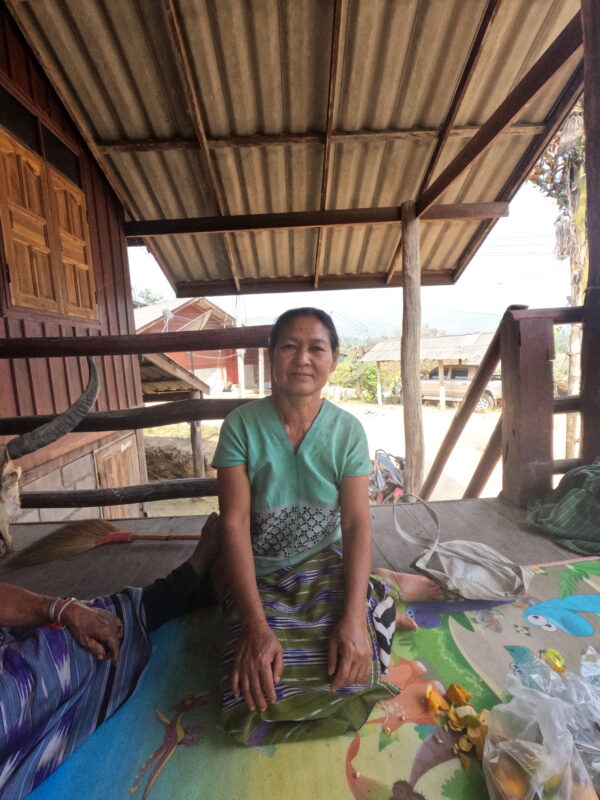
What do the different colors mean?
In the past, there was only white, black and red. So you would wear white before you are married, red for the wedding, and black after you are married. Now there are other colors, and you can wear them anytime.
I saw they are sold in the shop at reception of Chai Lai Orchid, do you like to see other people wearing these traditional shirts or would you prefer they are kept only for the Karen people?
We are very happy to share it with other people! We like to see the foreigner wear it when they come. But we also want to make them understand the meaning of it. If you wear it, it means you are wearing a blessing from the people who made it too.
What makes you happy?
When our children are happy. We like our family to be happy. I also feel grateful because I remember as a kid not always having a blanket or food to eat and now I have more than I need. I feel like I am very blessed.
What are your dreams?
My dream for the future is I want to see my kids and my kid’s family not working so hard like this
Following the conversation, the women gave Alexa (100RW) a blessing to have a good, healthy life of happiness fully of joy for her and her family. We are excited to shine the spotlight on these incredible rural women.
For more information, visit Daughters Rising and Chai Lai Orchid.
[row_inner_4 depth=”3″ depth_hover=”5″] [col_inner_4 span=”4″ span__sm=”12″] [/col_inner_4] [col_inner_4 span=”4″ span__sm=”12″] [/col_inner_4] [col_inner_4 span=”4″ span__sm=”12″] [/col_inner_4] [/row_inner_4] [row_inner_4 h_align=”center” depth=”3″ depth_hover=”5″] [col_inner_4 span=”4″ span__sm=”12″] [/col_inner_4] [col_inner_4 span=”4″ span__sm=”12″] [/col_inner_4] [/row_inner_4] [/col_inner_3] [/row_inner_3]
